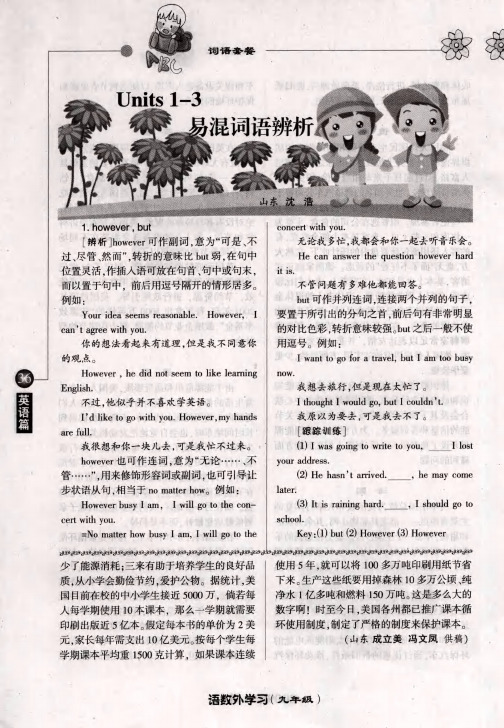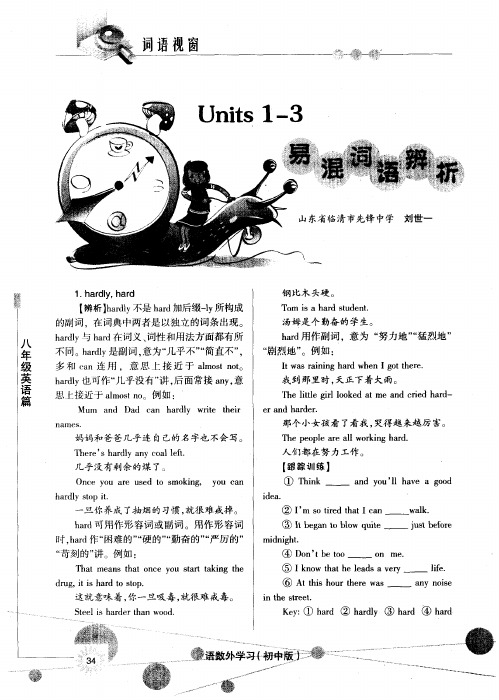八年级下册Units1~3易混词语辨析
- 格式:pdf
- 大小:275.92 KB
- 文档页数:5


译林版八年级下英语各单元易混淆单词和短语辨析汇总Unit1 易混淆单词和短语辨析1、辨析:just, just now我刚刚在学校图书馆里看见了凯特。
I saw her in the school library just now.我刚才在学校图书馆里见到了她。
◆ 考题链接翻译下列句子1、王先生刚刚离开我们的办公室。
____________________________________2、我刚才在街上遇到了我的一个朋友。
______________________________________【答案】1) Mr Wang has just left our classroom.2)I met one of my friends in the street just now. 2、辨析:ago, before例:I met an old friend two weeks ago. 两周前我遇到了一个老朋友。
My brother has never been to Harbin before.我哥哥以前从未去过哈尔滨。
◆ 考题链接1)He won’t come back _______ five.A. beforeB. afterC. byD. on2)The accident happened five hours _______.A. beforeB. afterC. agoD. by【答案】 1)A 2)C3、辨析: also,too,either,as well例:My little brother can also swim.我的小弟弟也会游泳。
I’m in Row Three, too.我也在第三排。
If you don’t go, I won’t go, either.如果你不去,我也不会去。
I'm going to Nanjing and my sister’s going there as well.我打算去南京,我妹妹也打算去那儿。


人教版八年级英语下册各单元易混淆单词和短语辨析汇总Unit1 易混淆单词和短语辨析1. 辨析too much,much too如:This table takes up too much room. 这张桌子太占地方了。
You are much too nice. 你实在是太好了。
考题链接—The meat is _______ delicious.—Yes, but don’t eat ______.A. too much, too muchB. too much, much tooC. much too, too muchD. much too, too many【答案】C【解析】too much太多,修饰不可数名词或作状语修饰动词;much too太,修饰形容词或副词原级;too many太多的,修饰复数名词。
根据delicious是形容词可知要用much too来修饰,too much可以修饰动词eat,故选C。
2. 辨析:sore,ache,pain如:She has a sore back. 她背疼。
I have a toothache. 我牙痛。
She felt a pain in her stomach. 她感到胃痛。
3.辨析:see sb. doing sth.,see sb. do sth.如:We saw him crossing the road.我们看见他正在过马路。
We saw him cross the road.我们看见他过马路了。
考题链接1. I saw them ________(play) basketball on the playground when I passed by.2. I often see him ________(play) table tennis with his son on the playground. 【答案】1. playing 2. play4. 辨析:expect,wish,hopeI wish I would fly. 我要是能飞就好了。

八下英语1到3重点单词和短语八年级下册英语词汇是学生们在学习英语过程中需要掌握的重点单词和短语。
下面将详细介绍八年级下册英语1到3单元的重点单词和短语,以帮助学生更好地学习和记忆。
Unit 1: How often do you exercise?1. exercise (v.) 运动,锻炼e.g. I exercise every day to keep fit.2. regularly (adv.) 经常地e.g. She goes swimming regularly on weekends.3. occasionally (adv.) 偶尔地e.g. We occasionally go out for dinner.4. rarely (adv.) 很少地e.g. He rarely eats fast food.5. hardly ever (adv.) 几乎从不e.g. I hardly ever watch TV because I'm too busy.6. never (adv.) 从不e.g. I never drink coffee because I don't like the taste.7. always (adv.) 总是e.g. She always arrives early for class.8. often (adv.) 经常e.g. They often go to the movies on weekends.9. sometimes (adv.) 有时候e.g. I sometimes stay up late to finish my homework.10. three times a week 每周三次e.g. He goes to the gym three times a week.Unit 2: What’s the matter?1. matter (n.) 事情,问题e.g. What's the matter? Why are you crying?2. feel (v.) 感觉e.g. I feel tired after a long day at work.3. headache (n.) 头痛e.g. I have a terrible headache.4. stomachache (n.) 胃痛e.g. She couldn't eat because of the stomachache.5. toothache (n.) 牙痛e.g. He went to the dentist because of a toothache.6. sore throat (n.) 喉咙痛e.g. I can't speak because I have a sore throat.7. runny nose (n.) 流鼻涕e.g. My sister has a runny nose and can't stop sneezing.8. cough (v.) 咳嗽e.g. He has been coughing all night.9. sneeze (v.) 打喷嚏e.g. I always sneeze when I'm allergic to something.10. take medicine 吃药e.g. You should take some medicine for the pain.Unit 3: What are you doing for vacation?1. vacation (n.) 假期,度假e.g. I'm going on vacation to the beach next week.2. trip (n.) 旅行e.g. We went on a trip to Paris last summer.3. camp (n.) 露营e.g. I went to summer camp and had a great time.4. stay (v.) 停留,逗留e.g. We stayed in a hotel during our vacation.5. visit (v.) 参观,访问e.g. They visited the Great Wall during their trip to China.6. hike (v.) 徒步旅行,远足e.g. We hiked in the mountains for the whole day.7. swim (v.) 游泳e.g. She loves to swim in the ocean.8. explore (v.) 探索,寻找e.g. We explored the ancient ruins and learned a lot.9. relax (v.) 放松e.g. I like to relax on the beach and read a book.10. have fun 玩得开心e.g. We had a lot of fun at the amusement park.Unit 4: What’s your favorite sport?1. sport (n.) 运动e.g. Basketball is my favorite sport.2. basketball (n.) 篮球e.g. The NBA is the highest professional basketball league in the world.3. soccer (n.) 足球e.g. The World Cup is the most watched sports event in the world.4. tennis (n.) 网球e.g. Roger Federer is one of the greatest tennis players of all time.5. volleyball (n.) 排球e.g. The USA women's volleyball team is a powerhouse in the sport.6. running (n.) 跑步e.g. The marathon is one of the longest running races.7. cycling (n.) 骑自行车e.g. The Tour de France is the most famous cycling race.8. swimming (n.) 游泳e.g. Michael Phelps is the most decorated Olympian in history.9. skiing (n.) 滑雪e.g. The Winter Olympics showcase the best in skiing and other winter sports.10. surfing (n.) 冲浪e.g. Surfing is a popular sport on the beaches of Hawaii.Unit 5: What are you going to be when you grow up?1. doctor (n.) 医生e.g. My dream is to become a doctor and help people.2. teacher (n.) 老师e.g. Teachers play a crucial role in shaping the minds of young students.3. engineer (n.) 工程师e.g. Engineers design and build the structures that make modern life possible.4. lawyer (n.) 律师e.g. Lawyers work to ensure justice and protect the rights of their clients.5. artist (n.) 艺术家e.g. Artists use their creativity to express themselves through various forms of art.6. musician (n.) 音乐家e.g. Musicians create and perform music that can touch the hearts of many.7. scientist (n.) 科学家e.g. Scientists study the world around us to uncover new knowledge and solve problems.8. astronaut (n.) 宇航员e.g. Astronauts travel into space to conduct research and explore the final frontier.9. firefighter (n.) 消防员e.g. Firefighters risk their lives to save others and protect property from fire.10. police officer (n.) 警察e.g. Police officers work to maintain public safety and enforce laws.以上是八年级下册英语1到3单元的重点单词和短语。

最新人教版八年级英语下册1-5单元易混淆单词和短语辨析汇总(整册)Unit 1: Confusing Words and Phrases1.Differentiating een "too much" and "much too"Too much" means "an excessive amount," and is an adjective XXX。
It can also be used as a noun phrase。
serving as the subject。
predicate。
or object in a sentence。
It can also n as an adverbial phrase。
modifying verbs.Much too" means "too" or "very," and is an XXX:This table takes up too much room.You are much too nice.n XXX:XXX _______ us.Yes。
but don't eat ______.A。
too much。
too muchB。
too much。
much tooC。
much too。
too muchD。
much too。
too manyAnswer: CXXX: "Too much" modifies XXX verbs。
while "much too" XXX"Too many" modifies XXX "us" is an adjective。
we use "much too" to modify it。
and "too much" can modify the verb "eat."2.Differentiating een "sore," "ache," and "pain"Sore" refers XXX。
.record(1)record作名词,表示“记录”This is a record of school attendance. 这是一份学生考勤记录。
He kept a record of what the speaker sail. 他把说话人所说的话都记录了下来。
(2)record作名词还可表示“有关某人或某物过去的已知事实;档案记录”。
He has an honorable record of service.他有光荣的服务记录。
(3)record作动词,表示“写出以作参考、记录”。
例如:The tape recorder has recorded his voice 录音机已经录下了他的声音。
Listen to the speaker carefully and record what he says. 仔细听讲,然后记下他所说的话。
2. have been to表示“到(去)过某处”,现在已不在那个地方。
如:He has been to England. 他曾到过英国。
(现在已经不在英国了)Have you ever been to the Great Wall? 你到过长城吗?(现在已经不在长城上)have gone to表示“去了某处”,“到某处去了”,现在已不在说话的地点了。
如:He has gone to England。
他已去英国了。
(已经不在说话的地方,到达英国或者在去英国的路上)3. timen. [U] 时间,时候如:Time never stands still.时间不会停滞不前。
The time has come for us to speak out是我们大胆讲话的时候了。
n. [C] 一段时间,时刻如:You have taken a long time writing the letter.你用了很长时间写这封信。
We had a good time together.我们一起度过了愉快的时光。
人教版丨八年级英语下册unit1考点:词语辨析Ⅰ. surprise,surprising及surprised的辨析1. surprise v 使吃惊surprise sb 使某人吃惊The bad news surprised me.2. surprising adj. 令人吃惊的What he said is surprising.3. surprised adj. 吃惊的We all felt surprised when we heard the news.be surprised at 对……感到吃惊be surprised to do sth 做某事而感到惊讶be surprised + that从句因……而惊讶4. surprise n. 惊讶to one’s surprise 使某人吃惊的是in surprise 吃惊地【典型例题】1.I got home for my birthday from my college on Friday evening. No one wasat home,and Mom and Dad hadn’t left me a note. This made me_________.A. surprisedB. happyC. angryD. excited【答案】C【解析】考点:考查形容词。
2. Much to our _________, Sam wasn’t _________ at the _________ news.A. surprise; surprised; surpriseB. surprise; surprised; surprisingC. surprised; surprising; surprisedD. surprising; surprised; surprise【答案】B【解析】试题分析:句意:使我们惊讶的是,山姆对这个意外的消息一点也不惊讶。
Module3 易混淆单词和短语辨析1. 辨析:discover, find, invent例:I looked for my pen for a long time but I didn’t find it at last.我找钢笔很长时间了,但是最后没有找到。
They discover the beauty of life.他们发现了生活的美。
The first vehicle was invented in 1885.第一辆车是在1885年发明的。
2. 辨析:j ust, just now例:She has just arrived.她刚刚到达。
My mother went to Shanghai just now.我妈妈刚刚去了上海。
3. 辨析:already, yet例:I have already called the police.我已经报过警了。
Have you finished your homework yet?你完成你的家庭作业了吗?4. 辨析:information, message例:You can get some information on the Internet.你可以从网上获取些信息。
We smile to communicate a message.我们笑是为了传达讯息。
5. 辨析:get, arrive, reach例:I will get to Beijing in two days.=1 will arrive in Beijing in two days.=1 will reach Beijing in two days.我会在两天后到达北京。
What time did you get/arrive/reach home?你是几点到家的?6. 辨析:someone,anyone, none, no one, everyone例:Someone is waiting for you.有人在等你。
关于初二英语易混词语辩析我们的初中生平常英语学习有没有积累一些错题历史总结,接下来,小编给大家准备了关于初二英语易混词语辩析,欢迎大家参考与借鉴。
关于初二英语易混词语辩析1. day , dateday 和date 这两个单词都与“日子”有关。
day 表示“日子,天”时,通常是指“某一天”的意思,它还含有“节日,假日,生日”的意思。
例如:He works1 eight hours a day. (他一天工作 8 个小时。
)They stayed in Beijing for three days. (他们在北京呆了 3 天。
) day 还可以表示“天气”。
例如:What a fine day! (多好的天气啊!)而 date 通常用来指“日期,时日,年代”等,它不仅包括一般的年、月中的“日期”,而且还可以指历史上的某一“年代”或“日期”。
例如:I don't know the date of the football match. (我不知道那场足球赛的具体日期。
)Please put a date on the letter. (请在信上写明日期。
)The date of her birth is November 18, 1989. (他出生于 1989 年 11 月 18 日。
)2. real, truereal 和 true 均表示“真的”的意思,都用作形容词,但 real 指客观存在的、并非想像或仿照的“真的,真正的”,其副词形式为really .例如:Is this real gold? (这是真金吗?)This is a story of real life. (这是现实生活中的一个故事。
)I really don't know what to do next. (我真地不知道下一步该怎么办。
)true 意为“真的,真实的”,它表示的“真实的,确实的”是和客观事实相一致的,并非杜撰、捏造的;其副词形式为 truly2 .例如:What he said is true. (他说的是真的。